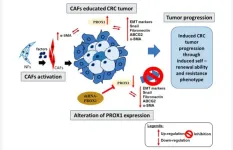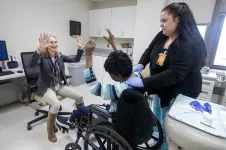(Press-News.org) Africa’s rice sector has major opportunities to increase its yield gains through improved agronomic practices while avoiding massive land conversion, a study by international scientists including a Husker co-investigator finds. The production advances can be important in meeting Africa’s projected food needs and reducing dependence on imports, the researchers concluded.
Rice demand in Africa is projected to more than double over the next 25 years due to population growth and increased rice consumption. At present, Africa imports nearly 40% of its rice.
“Nearly 15 million hectares of rice are waiting for yield improvement in Africa, but no yield gain can be achieved without better agronomy,” said Patricio Grassini, the University of Nebraska–Lincoln professor of agronomy who coordinated the team working on the research study, “Intensifying rice production to reduce imports and land conversion in Africa,” published in Nature Communications.
Agronomic practices involving improved land development, soil and plant nutrition, weed control and water management, as well as moderate cropland expansion, “could give the region a more optimistic future,” said Kazuki Saito, a former researcher at the Africa Rice Center who is currently at the International Rice Research Institute, who also contributed to the research.
The research project received support from the Bill and Melinda Gates Foundation through the Consultative Group for International Agricultural Research Excellence in Agronomy 2030 (incubation phase).
The research, conducted by researchers from the University of Nebraska–Lincoln, Huazhong Agricultural University, Africa Rice Center, and Wageningen University and Research, shows that current average rice yield in Africa is very low in relation to other parts of the world, indicating a substantial opportunity to enhance African rice production.
By employing a process-based crop simulation modeling approach combined with extensive on-the-ground data collection, the research team found that the average yield for Africa’s rice sector represents less than half the yield that could be achieved with improved agronomic practices.
Currently, domestic rice production in Africa meets about 60% of the continent’s demand. That import dependence places Africa in a vulnerable position. Without a substantial increase in rice yields, meeting future rice demand will require more rice imports, as well as conversion of wildlife habitat to agricultural use.
“Africa’s heavy reliance on imports not only poses a significant threat to food security, but also leaves the continent susceptible to external supply and price shocks, as has happened recently when India imposed bans on rice exports,” said Martin van Ittersum, a professor of agronomy at Wageningen University.
Africa’s rice imports represent about a third of the rice traded on the global market, said Shen Yuan, a professor of agronomy at Huazhong Agricultural University and lead author of the article.
Boosting African rice yields as outlined in the study can go far in “meeting the future rice demand of 150 million tons by 2050 without increases in current rice exports while reducing the pressure to convert land for rice cultivation,” said Shaobing Peng, a professor of agronomy at Huazhong Agricultural University who also contributed to the study.
The process-based crop simulation modeling approach used in the study “is a powerful tool to evaluate and determine opportunities for crop improvement” and has practical relevance for producers in Nebraska and nationwide, said Derek McLean, dean of the Agricultural Research Division at Nebraska.
“This study is an excellent example of our global presence and collaborative nature of researchers at UNL,” McLean said. “Supporting crop improvement, food security and agriculture stability throughout the world is good for Nebraska and will eventually catalyze opportunities for our producers.” Informed decision-making is key for crop improvement, McLean said, and the technology in this study “provides the key information needed to identify opportunities on a large scale.”
END
Africa could grow more rice -- new study shows how
2024-02-07
ELSE PRESS RELEASES FROM THIS DATE:
PROX1/α-SMA correlated with colorectal cancer progression, poor outcomes and therapeutic resistance
2024-02-07
“The findings validate the combined PROX1/α-SMA gene set as a prospective prognostic biomarker and a central regulator in CRC progression and its TME.”
BUFFALO, NY- February 7, 2024 – A new research paper was published in Aging (listed by MEDLINE/PubMed as "Aging (Albany NY)" and "Aging-US" by Web of Science) Volume 16, Issue 2, entitled, “PROX1 interaction with α-SMA-rich cancer-associated fibroblasts facilitates colorectal cancer progression and correlates with poor clinical outcomes and therapeutic resistance.”
The tumor microenvironment (TME) plays a vital role in tumor progression through intricate ...
Ancient rocks improve understanding of tectonic activity between earthquakes
2024-02-07
UNIVERSITY PARK, Pa. — Rocks once buried deep in ancient subduction zones — where tectonic plates collide — could help scientists make better predictions of how these zones behave during the years between major earthquakes, according to a research team from Penn State and Brown University.
Clues from rock formations in Alaska and Japan allowed the scientists to develop a new model to predict the pressure solution activity in subduction zones, the researchers reported in the journal Science Advances. ...
The Medical University of South Carolina will be one of four sites exploring the genetic basis of Parkinson’s disease in the Black community
2024-02-07
The Michael J. Fox Foundation for Parkinson’s Research has chosen MUSC as one of four sites for the Black and African American Connections to Parkinson’s Disease (BLAAC PD) research study, a part of the Global Parkinson’s Genetics Program.
BLAAC PD will explore the genetic basis of Parkinson’s disease (PD) in the Black community by genotyping more than 150,000 people worldwide, setting the stage for the development of targeted treatments. According to the Parkinson’s Foundation, approximately 36,265 people with ...
ORNL's Jason DeGraw named ASHRAE Fellow
2024-02-07
The American Society of Heating, Refrigeration and Air-Conditioning Engineers, or ASHRAE, selected Jason DeGraw, a researcher with the Department of Energy’s Oak Ridge National Laboratory, as one of 23 members elevated to Fellow during its 2024 winter conference.
A thermal-fluid scientist and mechanical engineer in the Thermal Energy Storage group, DeGraw was recognized for making substantial contributions in heating, ventilation, air-conditioning and refrigeration, and the built environment. He contributes education, research, engineering design and consultation, publications, presentations and mentoring to ASHRAE. At ORNL, DeGraw works with the Building Technologies ...
Sara Federico, MD, named director of the Solid Tumor Division at St. Jude Children’s Research Hospital
2024-02-07
(Memphis, Tenn. – February 7, 2024) St. Jude Children’s Research Hospital today announced Sara M. Federico, MD, has been named director of the institution’s Solid Tumor Division within the Department of Oncology. Federico is an internationally recognized leader in pediatric oncology whose contributions have defined the landscape of treatment for high-risk childhood solid tumors, such as neuroblastoma.
“Dr. Federico’s experience will pave the way for new discoveries that will help advance cure rates for patients with high-risk cancers by identifying, testing and optimizing novel therapeutic strategies,” said Julie R. ...
Cancer researcher Craig B. Thompson named 2024 Watanabe Prize winner
2024-02-07
INDIANAPOLIS – Pioneering cancer researcher Craig B. Thompson, MD, has been named the 2024 winner of the August M. Watanabe Prize in Translational Research.
Awarded by the Indiana University School of Medicine, the Watanabe Prize is one of the nation's largest and most prestigious awards recognizing individuals focused on shepherding scientific discoveries into new therapies for patients. The prize is awarded to a senior investigator who has made a significant contribution to the field of translational science.
Thompson is the former president and chief executive officer ...
Chapman scientists code ChatGPT to design new medicine
2024-02-07
Generative artificial intelligence platforms, from ChatGPT to Midjourney, grabbed headlines in 2023. But GenAI can do more than create collaged images and help write emails — it can also design new drugs to treat disease.
Today, scientists use advanced technology to design new synthetic drug compounds with the right properties and characteristics, also known as “de novo drug design.” However, current methods can be labor-, time-, and cost-intensive.
Inspired by ChatGPT’s popularity and wondering if this approach could speed up the drug design process, scientists in the Schmid ...
Erectile dysfunction drugs may be linked to reduced risk of Alzheimer’s disease
2024-02-07
EMBARGOED FOR RELEASE UNTIL 4 P.M. ET, WEDNESDAY, FEBRUARY 7, 2024
MINNEAPOLIS – The drugs used to treat erectile dysfunction may also be associated with a reduced risk of Alzheimer’s disease, according to a study published in the February 7, 2024, online issue of Neurology®, the medical journal of the American Academy of Neurology. The study does not prove that erectile dysfunction drugs reduce the risk of Alzheimer’s disease. It only shows an association.
Erectile dysfunction drugs, which work by dilating blood vessels to allow more blood ...
Q&A: Helping robots identify objects in cluttered spaces
2024-02-07
Imagine a coffee cup sitting on a table. Now, imagine a book partially obscuring the cup. As humans, we still know what the coffee cup is even though we can't see all of it. But a robot might be confused.
Robots in warehouses and even around our houses struggle to identify and pick up objects if they are too close together, or if a space is cluttered. This is because robots lack what psychologists call "object unity," or our ability to identify things even when we can't see all of them.
Researchers at the University of Washington ...
Evaluation of ruxolitinib, a Janus Kinase inhibitor, in multiple myeloma
2024-02-07
“[...] the results of the studies presented in this review will hopefully provide the impetus for conducting additional preclinical and clinical studies to evaluate RUX in the setting of MM as well as other types of cancer.”
BUFFALO, NY- February 7, 2024 – A new research perspective was published in Oncotarget's Volume 15 on February 5, 2024, entitled, “Preclinical and clinical evaluation of the Janus Kinase inhibitor ruxolitinib in multiple myeloma.”
In this new paper, researchers Ashley Del Dosso, Elizabeth Tadevosyan, and James ...










